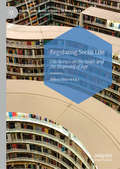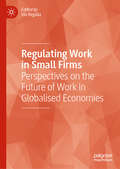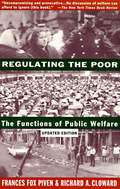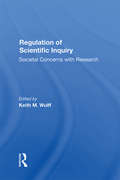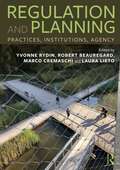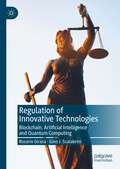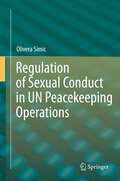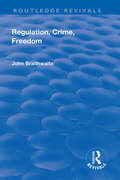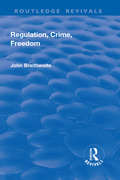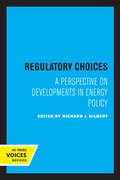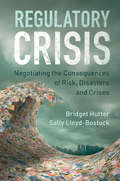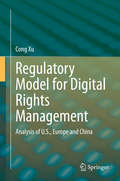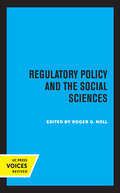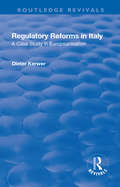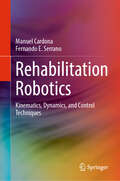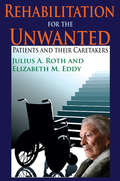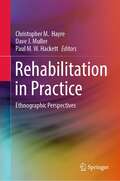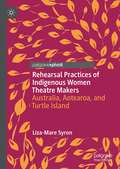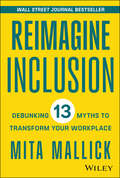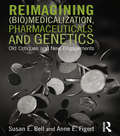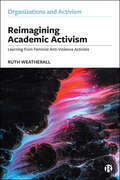- Table View
- List View
Regulating Sex: The Politics of Intimacy and Identity (Perspectives on Gender)
by Elizabeth Bernstein Laurie SchaffnerRegulating Sex is an anthology that presents debates over the role of the state in constructing and controlling erotic practice, intimacy, and identity. The purpose of this edited volume is to address sexual dilemmas in law and the state in substantive areas such as same-sex domestic partnerships, sexual economies, and childhood sexuality via a series of spirited dialogues between socio-legal scholars from diverse disciplinary, national, and political perspectives.
Regulating Social Life: Discourses on the Youth and the Dispositif of Age (Postdisciplinary Studies in Discourse)
by Helena OstrowickaThis book presents the original concept of the ‘dispositif of age’, combining post-Foucauldian analytics of the dispositif, discourse and governmentality with the historical semantics of Reinhart Koselleck to explore the functions of the notion of youth in the regulation of social life. Making use of examples from sources including scientific and media statements, youth policy programmes, and strategies at international (European) and local (Polish) levels, the author shows how this concept of youth supports processes of social regulation and contributes to the implementation of political goals as specific responses to issues such as radicalization and violence, unemployment, and economic crisis. This book will be of interest not only to scholars of discourse and youth studies, but also to all post-Foucauldian researchers with an interest in going beyond simple 'applicationism'.
Regulating Work in Small Firms: Perspectives on the Future of Work in Globalised Economies
by Ida RegaliaExploring the diversity of small firms, this contributed volume focuses on the crucial topic of work and the ways in which it is regulated, and offers reflections on the future of labour more generally. Traditionally managed through informal and adaptive processes, small firms allow us to understand the challenges and opportunities facing larger companies within an increasingly fragmented global production system. Analysing the case of Italy, a country characterised by a high number and wide variety of small firms, the authors draw on the results of a survey involving over 2,300 firms and face-to-face interviews with owner-managers working in 60 small and micro firms across several different sectors. Providing detailed analysis which will be useful for scholars of human resource management and small business, as well as managers, practitioners and policy-makers, the book enables a better understanding of the world of work in a globalised economy.
Regulating the Poor: The Functions of Public Welfare
by Frances Fox Piven Richard ClowardOriginally published in 1971, this social science classic outlines the social functions of welfare programs.
Regulation Of Scientific Inquiry: Societal Concerns With Rersearch
by Keith WulffThe increase in regulations affecting the conduct of scientific research, and the debate about their appropriateness and effectiveness, reflect societal concerns with fundamental questions raised by certain types of scientific inquiry. This book addresses issues of ethics, accountability, and conflict as they relate to the rights of inquiry, the rights of citizens, and the role of government in a research-oriented society.
Regulation and Criminal Justice
by Graham Smith Hannah Quirk Toby SeddonWhile regulatory institutions and strategies have been the subject of increasing academic attention, there has been limited application of regulatory theories to criminal justice scholarship. This collection of essays from a range of outstanding international scholars adopts a critical, inter-disciplinary approach, providing an innovative application of regulatory theory to the practice of criminal justice and offering suggestions for further research. Part I explores the aims and values of criminal justice and other regulatory networks and the synergies and tensions between these fields; Part II examines criminal justice as a regulatory force to control 'deviant' and anti-social behaviour and Part III examines the regulation and oversight of criminal justice through the operation of prison inspectorates and explores notions of responsive justice.
Regulation and Planning: Practices, Institutions, Agency
by Yvonne Rydin Laura Lieto Robert Beauregard Marco CremaschiIn Regulation and Planning, planning scholars from the United Kingdom, France, Italy, Sweden, Canada, Australia, and the United States explore how planning regulations are negotiated amid layers of normative considerations. It treats regulation not simply as a set of legal guidelines to be compared against proposed actions, but as a social practice in which issues of governmental legitimacy, cultural understandings, materiality, and power are contested. Each chapter addresses an actual instance of planning regulation including, among others, a dispute about a proposed Apple store in a public park in Stockholm, the procedures by which building codes are managed by planners in Napoli, the role that design plays in regulating the use of public space in a new Paris neighbourhood, and the influence of plans on the regulation of development in Malmö and Cambridge. Collectively, the volume probes the institutions and practices that give meaning and consequence to planning regulations. For planning students learning about what it means to plan, planning researchers striving to understand the influence of planners on urban development, and planning practitioners interested in reflecting on practices that occupy a great deal of their time, this is an indispensable book.
Regulation of Innovative Technologies: Blockchain, Artificial Intelligence and Quantum Computing
by Rosario Girasa Gino J. ScalabriniThis book explores the regulation of emerging technologies. Developments such as bitcoin (based on blockchain technology), artificial intelligence, quantum computing, and other technical advances have the potential to revolutionize many aspects of everyday life. As with other significant occurrences, especially when coupled by financial rewards, there are the inevitable attempts to reap gains unlawfully. This book examines the legal and regulatory enactments that attempt to undermine the risks to society as well as the dangers to individual freedoms that the technologies present when abused by governmental and non-governmental authorities. Included are discussions of the dangers to the right of privacy posed by facial recognition, physical location tracking, automated license plate recognition (ALPR) and other evolving applications of technology. This book is an invaluable resource for those interested in the regulation of emerging technologies particularly as they relate to blockchain, artificial intelligence, and the most current advances in quantum computing. Emphasis is focused on invasion of privacy, particularly by government authorities, antitrust implications of private companies and the efforts of international entities to counter alleged abuses by them.
Regulation of Sexual Conduct in UN Peacekeeping Operations
by Olivera SimicThis book critically examines the response of the United Nations (UN) to the problem of sexual exploitation in UN Peace Support Operations. It assesses the Secretary-General's Bulletin on Special Protection from Sexual Exploitation and Sexual Abuse (2003) (SGB) and its definition of sexual exploitation, which includes sexual relationships and prostitution. With reference to people affected by the policy (using the example of Bosnian women and UN peacekeepers), and taking account of both radical and 'sex positive' feminist perspectives, the book finds that the inclusion of consensual sexual relationships and prostitution in the definition of sexual exploitation is not tenable. The book argues that the SGB is overprotective, relies on negative gender and imperial stereotypes, and is out of step with international human rights norms and gender equality. It concludes that the SGB must be revised in consultation with those affected by it, namely local women and peacekeepers, and must fully respect their human rights and freedoms, particularly the right to privacy and sexuality rights.
Regulation, Crime and Freedom
by John BraithwaiteThis title was first published in 2000: John Braithwaite is a distinguished criminologist with an international reputation in the study of regulation and globalization. This collection contains his most important and influential essays in criminal justice and business regulation. It has a substantial introduction explaining the thematization of his work around the design of regulatory systems to maximize freedoms as non-domination.
Regulation, Crime and Freedom
by John BraithwaiteThis title was first published in 2000: John Braithwaite is a distinguished criminologist with an international reputation in the study of regulation and globalization. This collection contains his most important and influential essays in criminal justice and business regulation. It has a substantial introduction explaining the thematization of his work around the design of regulatory systems to maximize freedoms as non-domination.
Regulatory Choices: A Perspective on Developments in Energy Policy
by Richard J. GilbertRegulatory Choices offers the first comprehensive economic history of energy policy and its consequences for California, where some of the most innovative and far-ranging programs of regulatory reform have originated. The authors of this volume have gathered together an impressive wealth of material about actual policy decisions and their repercussions and have subjected their findings to astute economic analysis. This book will serve for years to come as an invaluable reference on the costs and effects of various energy policies. With its focus on bringing prices in alignment with the true cost of producing power and delivering it to the customer, the first part of the book outlines the issue of setting utility rates and considers some of the proposals to provide regulated industries with incentives to respond to economic and environmental concerns. The problems of energy supply occupy the second part of the book, which includes a survey of the costs of alternative energy sources and estimates of their environmental impacts, as well as a case study of the construction of the Diablo Canyon nuclear power plant. The book concludes by documenting the results of subsidy programs that were designed to target the development of wind power and residential energy conservation. Regulators, we learn, have a mixed record when it comes to managing the production of energy. Some conservation programs have enjoyed considerable economic success, particularly those that correct a lack of consumer information. Others, such as the renewable energy tax credits or programs designed to subsidize new technologies, have cost much more than the value of the energy they have saved. What emerges clearly from this study is that regulated industries are not immune from the forces of competition. This title is part of UC Press's Voices Revived program, which commemorates University of California Press’s mission to seek out and cultivate the brightest minds and give them voice, reach, and impact. Drawing on a backlist dating to 1893, Voices Revived makes high-quality, peer-reviewed scholarship accessible once again using print-on-demand technology. This title was originally published in 1991.
Regulatory Crisis: Negotiating the Consequences of Risk, Disasters and Crises
by Sally Hutter Bridget M. Lloyd-BostockUsing a new concept - 'regulatory crisis' - this book examines how major crises may or may not affect regulation. The authors provide a detailed analysis of selected well-known disasters, tracing multiple interwoven sources of influence and competing narratives shaping crises and their impact. Their findings challenge currently influential ideas about 'regulatory failure', 'risk society' and the process of learning from disasters. They argue that interpretations of and responses to disasters and crises are fluid, socially constructed, and open to multiple influences. Official sense-making can be too readily taken at face value. Failure to manage risks may not be central or even necessary for a regulatory crisis to emerge from a disaster; and the impacts for the regulator can take on a life detached from the precipitating disaster or crisis.
Regulatory Model for Digital Rights Management: Analysis of U.S., Europe and China
by Cong XuThis book highlights the shortcomings of the present Digital Rights Management (DRM) regulations in China. Using literature reviews and comparative analysis from theoretical and empirical perspectives, it appraises different DRM restriction regulations and practices as well as current advice on balance of interests to analyze the dilemma faced by the DRM system.This research intends to help China establish a comprehensive DRM regulatory model through comparative theoretical and empirical critiques of systems in America and Europe. A newly designed DRM regulatory model should be suitable for specific Chinese features, and should consist of government regulated, self-regulated, and even unregulated sections. The new regulation model might be an addition to existing legal structures, while self-regulations/social enforcement also would be as important as legislation based on case studies.
Regulatory Policy and the Social Sciences (California Series on Social Choice and Political Economy #5)
by Roger G. NollThis title is part of UC Press's Voices Revived program, which commemorates University of California Press’s mission to seek out and cultivate the brightest minds and give them voice, reach, and impact. Drawing on a backlist dating to 1893, Voices Revived makes high-quality, peer-reviewed scholarship accessible once again using print-on-demand technology. This title was originally published in 1985.
Regulatory Reforms in Italy: A Case Study in Europeanisation
by Dieter KerwerThis title was first published in 2001. The question this thesis attempts to answer is summarized as follows: what accounts for the amazing stability of Italian transport policy in the face of European challenges, given the fact that - as most national and European policy-makers readily believe - it is not capable of addressing the problem of the sector? This study analyzes the transport policy in Italy from the 1990s into the 21st century. It looks at how the two sub-sectors of surface transport, road haulage and raliways, have been managed by the public and private actors involved. In both sectors the policy appears to have failed, either by not offering a remedy to problems or by aggravating them further. The author believes that studying transport policy in Italy will shed light on the wider question of how national policy-making patterns are influenced by developments in the international environment; in this case looking closely at the influence of the European Union.
Rehabilitation
by Tony Ward Shadd MarunaOver the last two decades, empirical evidence has increasingly supported the view that it is possible to reduce re-offending rates by rehabilitating offenders rather than simply punishing them. In fact, the pendulum’s swing back from a pure punishment model to a rehabilitation model is arguably one of the most significant events in modern correctional policy. This comprehensive review argues that rehabilitation should focus both on promoting human goods (i.e. providing the offender with the essential ingredients for a 'good' life), as well as reducing/avoiding risk. Offering a succinct summary and critique of the scientific approach to offender rehabilitation, this intriguing volume for students of criminology, sociology and clinical psychology gives a comprehensive evaluation of both the Risk-Need Model and the Good Lives Model. Rehabilitation is a value-laden process involving a delicate balance of the needs and desires of clinicians, clients, the State and the public. Written by two international leading academics in rehabilitation research, this book argues that intervention with offenders is not simply a matter of implementing the best therapeutic technology and leaving political and social debate to politicians and policy makers.
Rehabilitation Robotics: Kinematics, Dynamics, and Control Techniques
by Manuel Cardona Fernando E. SerranoRehabilitation robotics is an important field of study focused on improving the gait rehabilitation of people affected by neurological disorders, ictus, cerebral palsy, and spinal cord injuries, among others. The study of rehabilitation robotics includes medical activities, kinematics dynamics, and control analysis. This book presents a complete and exhaustive analysis of the kinematics and dynamics of exoskeleton robots for rehabilitation. The forward and inverse kinematics are studied using the geometric, Denavit-Hartenberg, and screw theory approach. The dynamics analysis of exoskeleton robots using Newton-Euler, Euler–Lagrange, and D'Alembert formulation are also studied. Moreover, the main control techniques for exoskeleton robots are analyzed, including robust control, impedance control, adaptive control, Lyapunov functions, and uncertainties found in dynamic systems. The book includes MATLAB applications and examples.
Rehabilitation for the Unwanted: Patients and Their Caretakers
by Elizabeth Eddy Julius RothThis book is a study detailing what happens to people and what life is like in a rehabilitation program. The program discussed is embedded in an institution, called ""Farewell Hospital"" by the authors, that was designed to fill a demand for facilities for those judged unable to live on their own. Due to physical or mental handicaps and no family, friends, or other social agents who are willing to make a home for them outside of a public institution, these patients were placed in a rehabilitation unit.Most patients were placed with the rehabilitation unit as a brief interlude before their permanent placement in the custodial unit of the vast institution where they would live out their lives. This work deals with the question of what happens to patients once they are rehabilitated and the non-therapeutic rules and practices of the health and welfare structure of which they are a part. In this case, the rehabilitation specialists and ward workers set themselves the task of improving the life chances of their clients by treating their ailments when possible and by improving their physical functioning so that they were better able to care for their own needs.The authors examine the effects of the organizational relationships on rehabilitation outcomes and on the lives of the people who make hospitals their home. The text attempts to sustain feeling for the historical context of their study the ""problem"" of larger numbers of disabled, poverty-stricken persons, who are no longer wanted by anyone and asserts that a ""solution"" must be found.
Rehabilitation in Practice: Ethnographic Perspectives
by Paul M. W. Hackett Christopher M. Hayre Dave J. MullerThis book focuses on developing the use of ethnographic research for rehabilitation practitioners by recognizing its value methodologically and empirically in the field of rehabilitation. The very nature of ethnographic research offers an array of opportunities for researchers to understand the social world around them. The book identifies the multifaceted use of ethnographic methods in the rehabilitation setting. It touches on how acute and chronic conditions can affect the nature of ethnographic work in attempts to offer originality in a range of rehabilitation settings. Readers will find this collection of examples useful for informing their own research, and it aims to enlighten new discussion and arguments regarding both methodological and empirical use of ethnographic work internationally.
Rehearsal Practices of Indigenous Women Theatre Makers: Australia, Aotearoa, and Turtle Island
by Liza-Mare SyronThis transnational and transcultural study intimately investigates the theatre making practices of Indigenous women playwrights from Australia, Aotearoa, and Turtle Island. It offers a new perspective in Performance Studies employing an Indigenous standpoint, specifically an Indigenous woman’s standpoint to privilege the practices and knowledges of Maori, First Nations, and Aboriginal women playwrights. Written in the style of ethnographic narrative the author affords the reader a ringside seat in providing personal insights on the process of negotiating access to rehearsals in each specific cultural context, detailed descriptions of each rehearsal location, and describing the visceral experiences of observing Indigenous theatre makers from inside the rehearsal room. The Indigenous scholar and theatre maker draws on Rehearsal Studies as an approach to documenting the day-to-day working practices of Indigenous theatre makers and considers an Indigenous Standpoint as a valid framework for investigating contemporary Indigenous theatre practices in a colonised context.
Reichtumsförderung statt Armutsbekämpfung: Eine sozial- und steuerpolitische Halbzeitbilanz der Großen Koalition (essentials)
by Christoph ButterweggeChristoph Butterwegge zeigt am Beispiel des Rentenpaketes, der Mindestlohngesetzgebung und der jüngsten Erbschaftsteuerreform zugunsten von Firmenerben, dass die Regierungspraxis der 3. Großen Koalition aus CDU, CSU und SPD bis zur Hälfte der laufenden Legislaturperiode weder geeignet war, die Armut zu lindern, noch das Problem der sozialen Polarisierung zu lösen. CDU, CSU und SPD sind für die zunehmende Spaltung des Landes in Arm und Reich nicht einmal sensibel, wie der Koalitionsvertrag unter dem Motto ,,Deutschlands Zukunft gestalten" belegt. Obwohl die Regierungsparteien stolz verkünden, einen Großteil ihres gemeinsamen Programms für die 18. Legislaturperiode bereits verwirklicht zu haben, fällt die Erfolgsbilanz hinsichtlich der Verringerung und Verhinderung von Armut im wohlhabenden, wenn nicht reichen Deutschland nach Ansicht des Autors eher dürftig aus.
Reimagine Inclusion: Debunking 13 Myths To Transform Your Workplace
by Mita MallickReimagining what inclusion can look like in our organizations starts with understanding why these 13 DEI myths are not true—with practical and effective strategies for implementing transformative inclusivity. In Reimagine Inclusion, veteran DEI leader Mita Mallick debunks 13 myths that hold us back from transforming our workplaces. She delivers powerful storytelling combined with practical and hands on ways for us to be more inclusive leaders. She teaches us that when we show up as more inclusive leaders, we have the power to change our organizations, ultimately creating a ripple effect across our ecosystem. You’ll learn: How to understand, confront, and mitigate your own biases as you commit to do the work that starts with yourself. How to coach future leaders and to be intentional about how you lead in your organization—both in public and behind closed doors. To become an active participant in building your workplace’s culture. Reimagine Inclusion walks you through how to: understand the leader’s journey in your organization, interrupt bias at every key decision point, and transform your organization’s systems, processes, and policies to improve inclusivity at every level. This is a must have resource for managers and executives, founders and CEOs. Reimagine Inclusion is for anyone with a stake in building more inclusive, empathetic and resilient organizations, where each and every one of us can thrive.
Reimagining (Bio)Medicalization, Pharmaceuticals and Genetics: Old Critiques and New Engagements
by Susan E. Bell Anne E. FigertIn recent years medicalization, the process of making something medical, has gained considerable ground and a position in everyday discourse. In this multidisciplinary collection of original essays, the authors expertly consider how issues around medicalization have developed, ways in which it is changing, and the potential shapes it will take in the future. They develop a unique argument that medicalization, biomedicalization, pharmaceuticalization and geneticization are related and co-evolving processes, present throughout the globe. This is an ideal addition to anthropology, sociology and STS courses about medicine and health.
Reimagining Academic Activism: Learning from Feminist Anti-Violence Activists (Organizations and Activism)
by Ruth WeatherallHow can we reimagine the relationship between academia and activism to provide new opportunities for social change? Based on an ethnography with an anti-violence feminist collective, this vibrant and vital book develops an interdisciplinary approach to activism and activist research, helping us reimagine the role of scholarship in the fight against social inequality. With its reflections on novel tools that can be utilized in the fight for social justice, this book will be a valuable resource for academics in critical management studies, sociology, gender studies, and social work as well as practitioners and policymakers across the social services sector.

